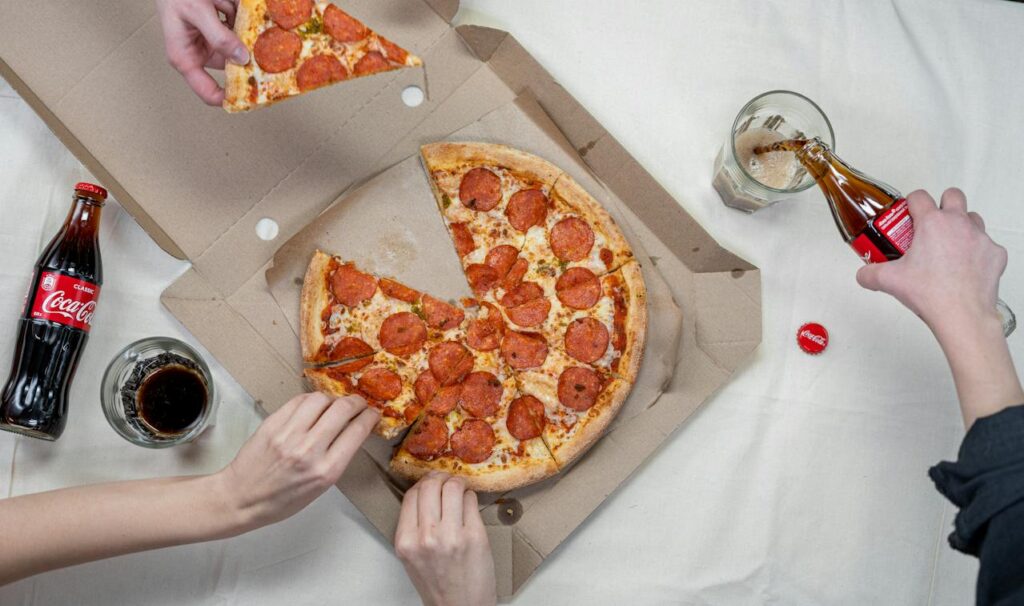Most of us know exactly what those pesky health vibe killers in our lives are, but sometimes the lines get slightly blurred. So let’s look into 13 bad habits that could be holding back your vitality.
Now, don’t just brush this off as another health lecture. Take some time to be honest with yourself and think about which sneaky habits that might be secretly messing with your health vibe.
Table of Contents
Skipping the Most Important Meal
Thinking about breakfast, it’s not just about filling your stomach. It’s about kickstarting your metabolism after a night’s rest. When you skip breakfast, your body doesn’t get the signal to start burning calories. Instead, it conserves energy, leading to sluggishness.
Missing breakfast often leads to overeating later in the day and this is one of the most common bad habits. Your body craves the energy it missed in the morning, and you might end up reaching for unhealthy snacks or overloading your plate at lunch. It’s not about eating a feast; even a simple meal like oatmeal or a fruit smoothie can set the right tone for your day.
Have a think about this one. Unless you’re locked into an intermittent fasting schedule, think twice about skipping breakfast.
The Screen Seduction
Ah, the lure of screens. It seems unavoidable for pretty much anyone, from the elderly on Facebook to the youngsters on TikTok. So what’s the deal here? It’s not just the physical effects like eye strain or disrupted sleep patterns.
Prolonged screen time can also lead to a form of social isolation. When hours are spent in front of a screen, less time is available for face-to-face interactions, which are crucial for mental health.
The content consumed can impact your mental state. Constant exposure to negative news or unrealistic standards on social media can lead to feelings of inadequacy or anxiety. It’s about finding a balance and ensuring that screen time doesn’t replace real human connections and physical activities.
The Water Neglect
Water – it’s the essence of life, yet oh so often forgotten. Not drinking enough water is like depriving your body of its basic needs. Water does more than just quench thirst.
It’s essential for nearly every bodily function. From aiding digestion to keeping your skin healthy, water is a critical component of your health. Chronic dehydration can lead to more severe issues like kidney stones and urinary tract infections.
The trick isn’t just to drink when you’re thirsty – thirst is a sign that you’re already dehydrated. Keeping a bottle of water handy and taking sips throughout the day can keep dehydration at a distance.
Herbal teas and water-rich fruits and vegetables also contribute to your daily water intake. If you’re not drinking enough water, challenge yourself to drink at least 8 glasses a day for a week and see how you feel. Thank me later.
Stress: The Silent Saboteur
Stress. It sneaks up on you, doesn’t it? Chronic stress can wreak havoc on your health, leading to issues like high blood pressure, heart disease, and a weakened immune system. Stress is more than just a feeling of being overwhelmed. It triggers a cascade of hormonal changes in your body.
Chronic stress leads to elevated cortisol levels, which can disrupt almost all your body’s processes. This puts you at an increased risk of numerous health problems, including anxiety, depression, digestive problems, heart disease, sleep problems, weight gain, and memory and concentration impairment.
Incorporating stress-reduction techniques like mindfulness, yoga, or even simple breathing exercises can help mitigate these effects. Oh and don’t forget about exercise, it works magic when it comes to stress management.
The Exercise Myth
With exercise, consistency is crucial. That once a week thing isn’t really going to cut it. It’s not just about burning calories; regular exercise improves cardiovascular health, boosts your immune system, and releases endorphins, all natural mood lifters.
It’s also about the type of exercise. A mixture of cardio, strength training and flexibility exercises is vital for overall fitness.
Even on busy days, a short walk, a quick yoga session, or some bodyweight exercises at home can make a difference. The idea is to make exercise a regular part of your routine, not just a weekend activity.
Sleep: The Forgotten Elixir
Neglecting sleep is like robbing your body of its repair time. Poor sleep habits can lead to some serious health problems over time, from weight gain to a weakened immune system. Aim for 7-9 hours of quality sleep; your body will thank you.
It’s not just the quantity but also the quality that counts. Poor sleep can lead to a weakened immune response, making you more susceptible to infections. It can also affect your judgment, coordination, and reaction times.
We’ve all been there, that cranky version of ourselves after a terrible night. In the long term, chronic sleep deprivation is linked to a higher risk of conditions such as obesity, diabetes, and heart disease.
Creating a sleep-conducive environment, establishing a regular sleep schedule, and avoiding stimulants like caffeine and electronics before bedtime can significantly improve your sleep quality.
The Junk Food Trap
Yes, that quick burger might seem harmless, but eating junk food can be a major health vibe killer. High in calories, low in nutrients – it’s a recipe for health problems down the line.
When it comes to junk food, the problem runs deeper than just excess calories. These foods are often high in trans fats, sugars, and sodium, leading to long-term health issues like heart disease, diabetes, and obesity.
At the end of the day, they’re low in essential nutrients, which can lead to deficiencies and impact everything from your immune system to bone health.
Sure, the occasional indulgence isn’t a problem, but a regular diet of processed foods can be problematic and is one of the most common modern bad habits.
Opting for whole foods like fruits, vegetables, lean proteins and whole grains will significantly improve your health and energy levels.
Overdoing the Caffeine
Love your coffee or energy drinks? Caffeine, in moderation, can be a harmless energy booster. However, in excess, it can lead to jitteriness, heart palpitations, and elevated blood pressure.
We know you don’t want to hear this, but over time, high caffeine intake can also cause dependency, making it harder to function without it.
This can lead to a vicious cycle of needing more caffeine to overcome the fatigue caused by the previous day’s caffeine crash.
It’s wise to limit your intake and be mindful of all sources of caffeine, including soft drinks and energy drinks, not just coffee and tea.
Ignoring Mental Health
Your mental health is just as important as your physical health. Mental health is key to your overall well-being and there are various bad habits that can impact it negatively.
Neglecting mental health can lead to serious consequences, including chronic stress, depression and anxiety, which can manifest physically.
Mental health issues can also lead to harmful coping mechanisms, such as substance abuse. It’s vital to address mental health proactively.
Remember, taking care of your mental health is not a luxury; it’s a necessity. Don’t take this lightly.
The Sitting Curse
Modern times have really brought this issue to the fore and it’s another of the bad habits of the times we live in. Extended periods of sitting have been linked to a range of health concerns, including obesity, increased blood pressure, high blood sugar, excess body fat around the waist, and abnormal cholesterol levels.
Also, too much sitting overall and prolonged periods of sitting can increase the risk of death from cardiovascular disease and cancer.
You simply have to force yourself to work some physical activity into your day. Simple changes like standing while talking on the phone, taking short walks during breaks, or using a standing desk can make a significant difference.
Neglecting Routine Health Checks
Think you’re too young or too healthy for regular check-ups? Think again. Routine health checks are vital for early detection and prevention of health issues. These checks can identify risk factors and early signs of diseases, allowing for timely intervention.
Regular screenings like blood pressure checks, cholesterol levels, diabetes screening, and cancer screenings are crucial, irrespective of your current health status.
They provide a clear picture of your health and can be life-saving in many cases. Remember, many severe health conditions are manageable, or even curable, with early detection.
Letting Negative Relationships Fester
Now this is a difficult one, but as you know negative relationships can be toxic to your health. The impact of negative relationships on health can be profound. Chronic stress from toxic relationships can lead to a range of physical health problems, including heart disease and a weakened immune system.
This can also severely affect your mental health, leading to anxiety and depression. It would be wise to evaluate your relationships and set boundaries to protect yourself.
Surrounding yourself with positive people who support and uplift you can have a significant positive impact on your overall health.
The Perils of Alcohol Abuse
Alcohol abuse is a critical issue that often flies under the radar when discussing health. Regular excessive drinking can lead to a mountain of health problems, including liver disease, heart problems, and an increased risk of certain cancers.
It’s not just the physical health that’s at risk; alcohol abuse can have profound impacts on mental health, leading to issues like depression and anxiety.
It’s super important to recognize the signs of alcohol abuse, which can include drinking more or longer than intended, a strong desire to drink, and continuing to drink despite it causing problems in your life.
If you or someone you know is struggling with alcohol abuse, seeking help is crucial. This is where resources like an alcohol treatment center can be invaluable. These centers provide a supportive environment for recovery, offering both medical assistance and counseling services.
Now, you might be thinking, “Wow, that’s a lot to take in!” And you’re right, it is. But don’t get overwhelmed. Start small, tackle just one of your bad habits at a time.
Swap Bad Habits for Good Ones: In Conclusion
Remember, it’s about making consistent, small changes. Your health is a journey, not a sprint. Listen to your body, be kind to it, and watch as your health vibe transforms.
Images from Pexels


